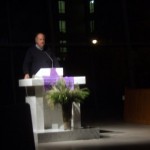Most religious communities treasure the accounts of the final days of their founders. It was during those last days of life the foundress or founder would leave her or his legacy to the community that meant so much to them. St. Paul of the Cross’ legacy to we Passionists was, ‘I place my trust in God. The Congregation is his; the lights he gave me for founding it were his. He will take care of its progress. My hope is in God.
When someone in the family dies the family comes together to say their last goodbyes and the dying person has the chance to do the same. It is an important time for all. In the Hebrew scriptures we read of the death of Isaac and his final words to his sons Esau and Jacob,’ Be loving of your brothers as a man loves himself, with each man seeking for his brother what is good for him….loving each other as themselves.’ We remember the great commandment of loving God with all our mind and heart and strength and loving our neighbour as ourselves.
In his farewell Jesus challenges his disciples to keep a new commandment, ‘love one another as I have loved you.’ In the past our neighbour was limited to the family members of the clan not to total strangers. Christ’s love is a universal love, no limits allowed. We are to be there in love for people we don’t know, men and women who are hungry, homeless, the naked, the sick and the imprisoned. These are the friends and neighbours and strangers who come into our lives sometimes at the most inconvenient of times challenging us to listen to their stories and love them with that same totality with which Christ loved us.
How did Christ love us? St. Paul tells us that Jesus did not consider his equality to the Father as something to be kept to himself. He emptied himself of his divinity and took on the fullness of our humanity and sharing in our humanity he took to himself the reality of a slave, an obedient slave, an obedience that brought him to his shameful painful death on the cross.
Paul tells us something we already know that can be times when a generous person will die for the sake of a friend – there is no greater love than to lay one’s life down for a friend – but what shows how great was Christ’s love for us is that while we were still sinners – still estranged from God – Christ died for us so that we could be one again with God.
Christ died for us knowing our sinfulness, knowing our selfishness, knowing how we exploit others for our own pleasure, knowing our propensity for violence toward others, knowing how we exclude other people from our lives. Knowing all these things about he was willing to die on the cross for us.
For Christ we were not tiny speck in the mass of humanity, he died for each of us as a person he loved – even unto death.
Love one another as I have loved you. Impossible! We are so caught up in our own little worlds, our needs, our wants we have so little time for others. That’s not always true. Think of the love you share with your spouse, think of the love you pour out on your children as you work through the struggles and stresses of marriage and parenthood. Think of the number of times you’ve been there for friends and neighbours, think of the many times you’ve been asked from this pulpit to be there through your generosity for men, women and children you will never know.
Love one another as I’ve loved you; accept one another as I accept with all your faults. Respect one another as you fight the good fight against racism, sexism, bigotry just as I respect you for how you were born, where you were born, when you were born.
We all know the difference between loving people and liking people. There a some people we will never like because of personality clashes and personal histories. To love people is to accept and respect them as they are knowing they are our brothers and sister, sons and daughters of God – loved by God with the same intensity with which God loves every one of us.
May we be graced every day to love others as we have been loved – totally, unconditionally.
 Founded by St. Paul of the Cross, every Passionist takes a special vow to spend his or her energies in promoting remembrance of the sufferings of Jesus, the memory of the Cross, and reflection of the meaning of the Cross for the world.
Founded by St. Paul of the Cross, every Passionist takes a special vow to spend his or her energies in promoting remembrance of the sufferings of Jesus, the memory of the Cross, and reflection of the meaning of the Cross for the world.




